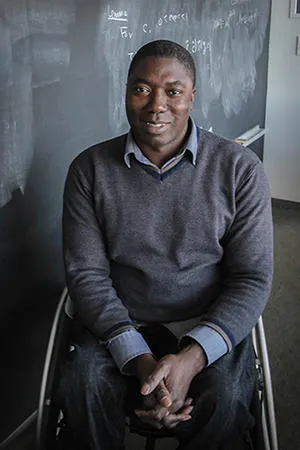
What first attracted you to the field of mathematics?
I was the first person to go to school in my family, let alone study mathematics. There was really nothing to suggest that I would develop an interest in mathematics.
My dad was a blacksmith, and I was expected to follow in that tradition. However, I got polio when I was young, which meant I could no longer do those kinds of physical activities. Even then, my dad was reluctant to send me to school, but he was eventually persuaded.
Some of my teachers and professors recognised that I had a gift for mathematics, and they encouraged me. That’s how I got started in mathematics.
What obstacles did you face in pursuing education?
There have been a lot of obstacles. First of all, back in the Ivory Coast, I initially wanted to study engineering. I passed the written part of the entrance exam for an engineering school, but during the oral exam, I was told that you had to stand up and work in the labs. Unfortunately, the equipment in the lab wasn’t adapted for someone like me, so I couldn’t attend that school. I was frustrated, but in the end, it worked out well for me.
I travelled to Canada for my PhD, and adjusting to a new country was difficult. I had to adapt to a different educational system and to life in a completely new environment.
But on the other hand, when you overcome those obstacles, you feel proud of yourself.
What is your proudest accomplishment in mathematics?
My research area, broadly speaking, is number theory. It’s a very old field that dates to before the time of the Greeks.
There are many simple mathematical questions that you could ask a high school student. However, just because a question is simple to ask doesn’t mean it’s simple to answer. Some of these questions have solutions that turn out to be highly complex, requiring the development of sophisticated mathematical tools. In that sense, number theory is a very exciting area.
My work focuses on what are called Hilbert modular forms. I’ve developed some of the most efficient algorithms for working with these objects, and I think this is my proudest accomplishment.
Do you think universities are doing enough for disabled people?
Universities have improved quite a lot. There has been tremendous progress, but there is still a lot to improve.
I think some of the challenges I faced growing up in the Ivory Coast still remain in developing countries.
What advice would you give to young mathematicians, especially those overcoming significant challenges?
It’s a cliché when people say, “Follow your passions,” but that’s truly my advice. I believe things always work out for the best. By persisting, challenges often turn into opportunities. By persevering, you can transform obstacles into something positive and perhaps even use them to inspire others.
My advice would be: follow your passion and persevere, because things will always work out for the best.